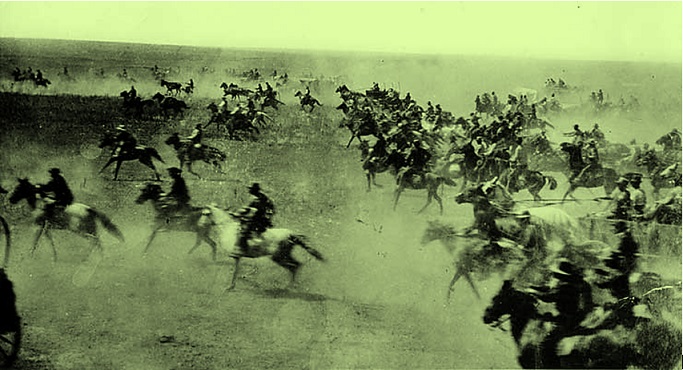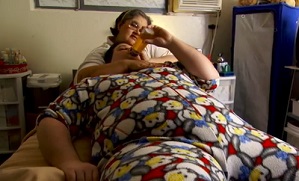
If you’ve ever been a teacher, you may have experienced a moment like this:
One of your darlings is off-task and taking others down with her. After a few verbal redirections, you tell her to move to a seat further from her audience – probably near your desk.
“No no no no no! I’ll stop! I’ll stop! Just one more chance! One more chance!”
“Those chances have passed, anonymous sample child – let’s go. Come on.” You motion firmly, but with style.
“Pleeeease?! Look – I’m working!” She waves a piece of paper around vigorously, believing this irrefutable evidence of focus and commitment. I’ve always found that part weird.
You are firm, but not angry. “C’mon. NOW.” You tap the destination desk a few times for emphasis.
At the first sign of acquiescence, you continue whatever you were doing, and efficiently guide the class back on track. It may be several minutes before you notice she hasn’t actually moved.
“Child’s Name. Seriously. Over. Here.” Motion motion motion.
 “I’m not talking anymore! I can’t see over there! I’m being good! Just one more chance and if I mess up, you can move me! Please?!?!?? Pleeeeaaaaassssseeeee??!?!?!!!???”
“I’m not talking anymore! I can’t see over there! I’m being good! Just one more chance and if I mess up, you can move me! Please?!?!?? Pleeeeaaaaassssseeeee??!?!?!!!???”
Because you are a master of classroom management, you overcome this distraction yet again, and this time you wait until she’s physically moving before you once again guide the rest of the room back into the edu-zone. Now the learning can happen!
A few moments later you realize she’s moved exactly one desk over. If you’re lucky, it’s at least a diagonal move, which you COULD count as two desks.
*sigh*
At this point you have two choices. (1) Give up on having class in order to kill this child dead in front of God and everyone as a warning to others, or (2) pretend this was exactly what you intended all along, or at least an acceptable compromise. “OK. Good! Now stay put!” Firm gaze, hint of wry smile so they know your scolding isn’t personal and you’re still the cool teacher they secretly adore.
 The issue is not bold defiance or soft incompetence. It’s a calculated risk on the part of the student – who knows you. She’s betting you won’t go nuclear on her – no referrals, no yelling, no hurling heavy objects. She’s ready at any point to back down and comply – at least until your attention has shifted. She’s also sure you have things you’d rather be doing than power struggle with her, and that you don’t actually dislike her – even if she is making you crazy at the moment.
The issue is not bold defiance or soft incompetence. It’s a calculated risk on the part of the student – who knows you. She’s betting you won’t go nuclear on her – no referrals, no yelling, no hurling heavy objects. She’s ready at any point to back down and comply – at least until your attention has shifted. She’s also sure you have things you’d rather be doing than power struggle with her, and that you don’t actually dislike her – even if she is making you crazy at the moment.
She ends up sitting pretty close to where she began. Even if she moves today – all the way to that desk next to yours – tomorrow she’ll come in and sit where she started, waiting to see if you say anything and begin the struggle anew.
That’s the ‘Boomer’ movement. That’s David L. Payne.
Like many who make history, David L. Payne had an unwavering conviction that he was right. That sort of bold confidence can be rather irritating, but it’s typical of those who inspire others to follow them.
In Payne’s case, the question wasn’t always who’d follow so much as who could keep up. A hunter, scout, politician, and businessman, he was certainly never at a loss for things to do. Then again, he doesn’t seem to have stayed in the same place for more than a few years at a time… so there’s that.
 He had a common-law wife and a son who was, by definition, “out-of-wedlock.” He volunteered to fight for the Union as soon as the war broke out, then stayed in the army to help ‘civilize’ the Great Plains after. He fought under Custer and knew Kit Carson and Wild Bill Hickok.
He had a common-law wife and a son who was, by definition, “out-of-wedlock.” He volunteered to fight for the Union as soon as the war broke out, then stayed in the army to help ‘civilize’ the Great Plains after. He fought under Custer and knew Kit Carson and Wild Bill Hickok.
He had a reputation for ‘understanding’ the ‘Indian character’, which seems to have meant he was pretty good at the ‘killing them’ part. Fortunately for him, this kind of thing was in great demand in the decades following the Civil War.
Oh – and he was tall. 6’4” or thereabouts.
Why all the background? Because he’s my daddy – and yours too, if you’re an Okie. Don’t be ashamed! Own your statehood! I mean, come on – it’s not like you’re from Florida or something.
After Charles Carpenter bailed on the young ‘boomer’ movement, Payne stepped up in a big way. He sold theoretical claims to plots in the Unassigned Lands and talked up efforts to move in and truly settle the area. Unlike Carpenter, he actually accompanied most of the forays into Indian Territory (I.T.), taking on the same risks and hardships as those who followed him.
 He was removed by the U.S. Army, but he went in again. He was removed again, then went in again. Removed, return, removed, return, removed, return, removed…
He was removed by the U.S. Army, but he went in again. He was removed again, then went in again. Removed, return, removed, return, removed, return, removed…
You may notice a pattern.
Notable was the lack of meaningful consequences for these repeated violations. He was threatened, and eventually fined (he didn’t pay it), but he wasn’t locked up. He wasn’t killed. He was just… removed.
And then he returned.
 He KNEW the U.S. Army didn’t actually want to shoot anyone over this land. He was betting they wouldn’t even actually imprison him – or anyone else – for any length of time. Not for THIS.
He KNEW the U.S. Army didn’t actually want to shoot anyone over this land. He was betting they wouldn’t even actually imprison him – or anyone else – for any length of time. Not for THIS.
What they WERE willing to do was march his party back home time and again, often by long, dry routes, on foot, with limited food or water. What they WERE willing to do was embarrass or frighten them.
Ironically, the most humiliating removals were those handled by Buffalo Soldiers – black units organized in the west primarily as ‘Indian Fighters’. While typically more professional and better behaved than their white peers, the idea of hungry white homesteaders being escorted off of red land by black soldiers was particularly difficult for many to bear.
 And then he returned.
And then he returned.
Payne had dealt with the law and government and the military before. At any given moment, he was willing to comply. They had the guns and the authority, but he had unlimited time and patience. And – this part is key, so pay attention – he believed he was entirely right.
It wasn’t simply that he thought he could ‘get away with it’, although he did. It wasn’t just that the Boomers he organized and spawned really truly needed this land, although in their minds they did. He believed without reservation that these lands were public lands, and should be opened to white settlement – enough to want to force the issue.
Payne wanted a trial to determine whether or not the Unassigned Lands were still reserved for unspecified ‘Indian’ use, or should be thrown open to white settlement on the same terms as other lands in the west.
 Payne believed.
Payne believed.
He may have been wrong. Stubborn. Annoying. Tall. But whatever else he was, Payne acted with the firm conviction that if he WERE breaking the law, the law NEEDED to be broken in order for constitutional mechanics to engage and his actions to be vindicated – not only for himself and his subscribers, but for the greater American good.
This, in my mind, sets the Boomers apart in an essential way from the Sooners with whom they are so unjustly joined in commemorative song. I’m not vindicating the Boomers, but I am suggesting that – at least at the leadership level – they acted in accordance to their understanding of our foundational ideals and constitutional law. They believed they were in the RIGHT, and stood stubbornly by this until vindicated.
The Sooners, on the other hand… Hmph.
David L. Payne died at breakfast on November 28th, 1884. Nearly five years later, on April 22, 1889, the first of the infamous Oklahoma Land Runs began opening up the Unassigned Lands to white settlement. This time the settlers were allowed to stay.

RELATED POST: Boomes & Sooners, Part One ~ Last Call Land-Lovers
RELATED POST: Boomers & Sooners, Part Two ~ An Editorial and a Carpenter
RELATED POST: Boomers & Sooners, Part Four ~ Dirty Stinkin’ Cheatin’ No Good Sons Of…
RELATED POST: Boomers & Sooners, Part Five ~ Cheater Cheater Red Dirt Eater

 I’m often amazed at the interactions I have with parents. By and large they let me off WAY too easy. Most tend to be focused on their child and what’s best for them in the long run, with each of us assuming the other to be relatively competent and doing the best they can with the time and resources at their disposal. Some of them have actually become Facebook or Twitter friends, so I see pictures of their dogs and family vacations. We’re not moving in together or anything, but it’s generally been warm and fuzzy and one of the reasons I love my job.
I’m often amazed at the interactions I have with parents. By and large they let me off WAY too easy. Most tend to be focused on their child and what’s best for them in the long run, with each of us assuming the other to be relatively competent and doing the best they can with the time and resources at their disposal. Some of them have actually become Facebook or Twitter friends, so I see pictures of their dogs and family vacations. We’re not moving in together or anything, but it’s generally been warm and fuzzy and one of the reasons I love my job. 1. Don’t talk to your child’s teachers. Why waste your time on the underlings when a little research allows you to directly contact the District Superintendent, Director of Curriculum, Assistant Director of Operations, and whatever an ‘Elementary and Secondary Compliance Manager’ is? Express your outrage and make sure they know WHO YOU ARE (i.e., someone far more important than whatever else is taking up their time and energy).
1. Don’t talk to your child’s teachers. Why waste your time on the underlings when a little research allows you to directly contact the District Superintendent, Director of Curriculum, Assistant Director of Operations, and whatever an ‘Elementary and Secondary Compliance Manager’ is? Express your outrage and make sure they know WHO YOU ARE (i.e., someone far more important than whatever else is taking up their time and energy).
 5. On that note, let’s not forget who this is really about – your child. There’s always someone out there trying to drive you apart from your baby, spreading their maliciously smooth rhetoric about development, maturity, and taking on personal responsibility. Fine. One day, maybe. But NOT today, and not in High School, or College, or those first few Nobel-worthy careers, or planning your dream wedding, or in that first marriage, or –
5. On that note, let’s not forget who this is really about – your child. There’s always someone out there trying to drive you apart from your baby, spreading their maliciously smooth rhetoric about development, maturity, and taking on personal responsibility. Fine. One day, maybe. But NOT today, and not in High School, or College, or those first few Nobel-worthy careers, or planning your dream wedding, or in that first marriage, or –  6. Exploit weakness. Every time a teacher bends a policy to accommodate you, or an administrator responds with more than five words to your eleven page email of demands and complaints, it’s a sign you’re winning. A weaker parent would appreciate the gesture and back down – they’d “compromise.” Don’t fall for it. You’ve got your inch; double down and grab that ell.
6. Exploit weakness. Every time a teacher bends a policy to accommodate you, or an administrator responds with more than five words to your eleven page email of demands and complaints, it’s a sign you’re winning. A weaker parent would appreciate the gesture and back down – they’d “compromise.” Don’t fall for it. You’ve got your inch; double down and grab that ell.  Even better, word will get around to avoid any real standards or expectations regarding your child – it’s just not worth the costs, especially with 150 other kids who need our help, our best lesson planning, our most creative adjustments, and our well-rested, back-in-perspective attention. You’ll have won, and your child will be safe – at least until some foolish, idealistic educator slips and treats them just like everyone else again.
Even better, word will get around to avoid any real standards or expectations regarding your child – it’s just not worth the costs, especially with 150 other kids who need our help, our best lesson planning, our most creative adjustments, and our well-rested, back-in-perspective attention. You’ll have won, and your child will be safe – at least until some foolish, idealistic educator slips and treats them just like everyone else again.  I’m a fairly narcissistic fellow. I don’t mean to be, it’s just that I’m vain and self-absorbed. At least I have the skills, style, and cojones to make it work for me. I make no apologies; every rose has it’s – oh, are you still here? I hadn’t noticed.
I’m a fairly narcissistic fellow. I don’t mean to be, it’s just that I’m vain and self-absorbed. At least I have the skills, style, and cojones to make it work for me. I make no apologies; every rose has it’s – oh, are you still here? I hadn’t noticed. I’m pretty entertaining, and I have a degree. That should buy me some leeway, yes?
I’m pretty entertaining, and I have a degree. That should buy me some leeway, yes?
 Which, by the way, is pretty much what many of you keep telling me about my teaching methods. You know – if I were doing it right, I wouldn’t have to work so hard to coerce and browbeat them… like you’re doing to us?
Which, by the way, is pretty much what many of you keep telling me about my teaching methods. You know – if I were doing it right, I wouldn’t have to work so hard to coerce and browbeat them… like you’re doing to us? When I’m in my classroom, my number one ethical and professional obligation has absolutely nothing to do with your studies, your strategies, and sure as hell not your tests – mandated or not. I’ll certainly consider the input of my department and my building leadership, but even those should take a back seat to what I think and feel and believe will be best for MY kids, today, right now.
When I’m in my classroom, my number one ethical and professional obligation has absolutely nothing to do with your studies, your strategies, and sure as hell not your tests – mandated or not. I’ll certainly consider the input of my department and my building leadership, but even those should take a back seat to what I think and feel and believe will be best for MY kids, today, right now. We’ve become SO comfortable doing things we know are bad for our kids because they’re ‘required’. Maybe we’re afraid, or maybe we simply hide behind what everyone else is doing. Is this such a rewarding career in terms of money, power, and glory, that we’ll sacrificing the very things that made it matter to begin with in order to keep it secure? Must be a helluva extra duty stipend.
We’ve become SO comfortable doing things we know are bad for our kids because they’re ‘required’. Maybe we’re afraid, or maybe we simply hide behind what everyone else is doing. Is this such a rewarding career in terms of money, power, and glory, that we’ll sacrificing the very things that made it matter to begin with in order to keep it secure? Must be a helluva extra duty stipend. 

 I’ve been revisiting the chapter on “Classroom Control” from Vol. I of the 12-volume The Class Room Teacher (1927-28). We were introduced last time to a very listy list of possible methods:
I’ve been revisiting the chapter on “Classroom Control” from Vol. I of the 12-volume The Class Room Teacher (1927-28). We were introduced last time to a very listy list of possible methods:  The teacher is attempting to carry on a class recitation with one group of children while the others are supposed to be studying. Two or three large boys are lying on the floor with their feet propped against the stove. They are reading fiction which does not contribute in any way to their assignment. They later show a lack of knowledge as to the lesson content. Several girls are holding an animated conversation about the ways of securing pictures of the favorite “movie” actresses.
The teacher is attempting to carry on a class recitation with one group of children while the others are supposed to be studying. Two or three large boys are lying on the floor with their feet propped against the stove. They are reading fiction which does not contribute in any way to their assignment. They later show a lack of knowledge as to the lesson content. Several girls are holding an animated conversation about the ways of securing pictures of the favorite “movie” actresses.  In case we’re not sufficiently horrified by the stove thing, here comes a barrage of projectiles and dirty notes. I KNEW we should never have allowed pens and paper in the classroom – such technology has no place in school without careful controls in place! It’s too distracting!
In case we’re not sufficiently horrified by the stove thing, here comes a barrage of projectiles and dirty notes. I KNEW we should never have allowed pens and paper in the classroom – such technology has no place in school without careful controls in place! It’s too distracting! Today I believe that would qualify as a ‘controversial statement’. Keep in mind that the 1920’s were still enmeshed in Progressivism – regulating the sausage factories and establishing national parks and such. It was also the age of more direct control of all levels of government by the ‘common man’, in hopes this would prove, um… purifying.
Today I believe that would qualify as a ‘controversial statement’. Keep in mind that the 1920’s were still enmeshed in Progressivism – regulating the sausage factories and establishing national parks and such. It was also the age of more direct control of all levels of government by the ‘common man’, in hopes this would prove, um… purifying.  Ever after the children study the lessons assigned by the teacher, answer her questions, and accept the punishment she doles out for misdemeanors and errors. They usually do no more than they are asked, and frequently they misbehave when the teacher is not looking.
Ever after the children study the lessons assigned by the teacher, answer her questions, and accept the punishment she doles out for misdemeanors and errors. They usually do no more than they are asked, and frequently they misbehave when the teacher is not looking.  As colorful a term as ‘benign tyrant’ may be, it’s a bit too loaded with connotation for my taste. One of the things too easily overlooked in our kneejerking any time those high-structure charters are discussed is that some students, in fact, do very well with so much structure.
As colorful a term as ‘benign tyrant’ may be, it’s a bit too loaded with connotation for my taste. One of the things too easily overlooked in our kneejerking any time those high-structure charters are discussed is that some students, in fact, do very well with so much structure. Ah, she means (insert whatever political party you don’t belong to), doesn’t she?
Ah, she means (insert whatever political party you don’t belong to), doesn’t she?